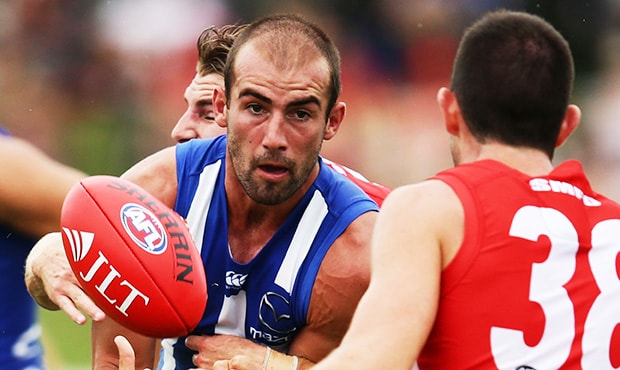BEN CUNNINGTON was called out late last season.
A player good enough to win an AFL club best and fairest award in 2014 – at age 23 – then finish runner-up a year later, still had a significant hole in his football package.
For all of Cunnington's excellence in the clinches, his ability to explode away from stoppages and run opponents into the ground is regularly brought into question.
Then came last year's relative fall from grace, even though some of the numbers that represent the true Cunnington were still there.
He led North Melbourne in contested possessions, clearances and handballs, but was inconsistent and his impact lessened, hence a slide to eighth in the Roos' best and fairest count.
That stung Cunnington, according to teammate and close friend Jamie Macmillan.
"I know he was pretty disappointed about his season last year and he got hit up towards the end of the year," Macmillan told AFL.com.au.
"He's probably always accepted he wasn't the greatest runner, but he's really knuckled down with one of our fitness guys (Jona Segal) and done an enormous amount of work and got a lot fitter.
"It's showing at the minute – he's moving a lot better."
Cunnington, who turns 26 in June, stayed in Melbourne in the off-season in preference to his typical extended stint back home on a dairy farm near Princetown, on the Great Ocean Road.
It was an enlightening period for him, given he and his wife, Belinda, had their first child, Xavier, in October.
Segal was ever-present whenever the 2009 No.5 draft pick completed running sessions – albeit generally a metre ahead – to drive him on.
North youngsters Sam Durdin and Kayne Turner were also among his regular companions.
"I was always doing them (running drills), but, as anyone in the AFL can vouch for, when you run on your own, you think you're going hard, but you're not, really," Cunnington said.
"I would do all the sessions and feel like I'm ticking them off and working hard, but when you do them with Jona and a few boys would jump in, you're pushing even harder.
"It's that competitive side – you get a bit more out of yourself. That's where I feel I have that edge."
The numbers back up Macmillan's hunch, while still showing more needs to be done.
Cunnington is a more svelte 88kg, about 4kg lighter than he was a year ago, and averaging 10-plus-minute playing stints – 90 seconds more than ever before – in his two matches in 2017.
His game time (72.8 per cent), disposals (24.5) and uncontested possessions (12) are also up, but his metres gained (179m) has gone backwards.
What must excite Kangaroos fans more are the three footballers Cunnington admires most and wants to model his game on.
"I know it's more of a child thing, but I still try and look at three players, in particular, and get little things off them," Cunnington said.
"Josh Kennedy, from Sydney, he's probably my ultimate player. I love playing against him and take a lot out of it.
"It's just that respect and, I guess, even that mutual respect for each other."
Kennedy, for example, has spent 86.4 per cent of game time on the field since the start of last year and churned out 361 metres gained per match.
The other players are West Coast’s Matt Priddis and Adelaide veteran Scott Thompson.
"It's (Priddis's) fall-of-the-ball work and the way he just gets to contests … I feel (Thompson's) body work is up there with the best."
Cunnington wrestled this week with what 'elite' means. One thing he was sure of was that Kennedy, Priddis and Thompson were that.
And he would like to be considered in that company, even if the "private kid" who enjoys escaping with a fishing rod isn't concerned about external views.
"I think he already is elite," Macmillan said of Cunnington.
"His inside work is up there with the best at the footy club. His hands, tackling, ability to find space and ability to put people in space is elite.
"For him, it's always been about getting out of the stoppage, and you wouldn't put him in the elite category, but he's worked enormously hard on it and he's getting there."



